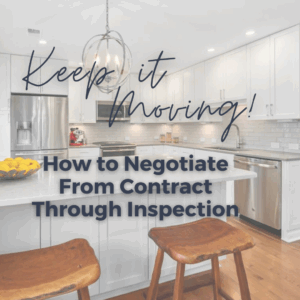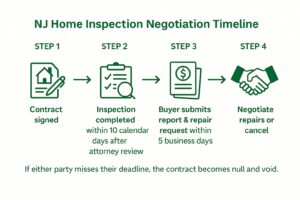How to Negotiate From Contract Through Inspection

Selling a home is an emotional experience for many of us. Your home is part of who you are and where you’ve been at a certain stage of your life.
But first and foremost, selling a home is actually a business transaction with a buyer—and that’s easy to forget in the heat of negotiations.
That’s why you don’t want to get swayed by emotion. You could end up making negotiation mistakes that you’ll regret later in your final contract with the buyers. Remember, the outcome of this transaction can impact your next step in buying your next home.
Don’t forget that both you AND the buyer want to close the deal. So don’t have a “winner take all” mindset but be willing to compromise when necessary while still looking out for your best interests.
Your home is not sold until settlement day and it’s crucial to stay cool, calm and collected during the under contract phase, because that is when a lot of negotiating can happen that will make or break the sale.
Why the Inspection Period Matters
After an offer is accepted and the contract is signed, the inspection period begins. Buyers hire a licensed inspector to evaluate the property’s condition, and their findings can spark critical negotiations. From structural issues to plumbing concerns, what’s discovered here can make or break the deal
📌 Real Estate Contract Inspection Timelines

- 10 Calendar Days: After attorney review ends, the buyer has 10 calendar days to complete all inspections (this date is called the “Completion Date”).
- 5 Business Days: The buyer then has 5 business days after the Completion Date to either:
- deliver the inspection report + a notice of cancellation, OR
- deliver the report + a written repair request (called the “Amendment”).
⚠️ In one of our Brokerage Meetings we discussed this Seller situation which will illustrate the importance of the timelines:
In one of our seller represented deal, we had the buyer’s attorney extend the inspection period by additional 10 days beyond the default 10 days on the contract. The inspection itself happened just a few days later, but the buyer waited until the 20th day to request repairs. To make matters worse, they presented a roof estimate for $27,000, while our seller had their own estimate of just $7,000.
The seller was understandably frustrated—especially since their home was effectively off the market for three weeks. In some markets, that’s enough time for market conditions to shift, costing sellers valuable opportunities.
👉 Takeaway for Sellers: If you agree to extend the inspection period, also require the buyer to submit their repair requests within 24–48 hours of the inspection itself. This keeps negotiations on track and prevents your home from being tied up too long.
Here are some tips for negotiating once your home is under contract:
1. Determine the Buyer’s Motivation and Timing
Why does the buyer want your home? Are they relocating for a job, expecting a baby, or juggling the sale of their own property? These factors affect how quickly they want (or need) to move forward—and can give you leverage in negotiations.
2. Keep the Conversation Going
As a seller, you should always respond to an offer. By submitting a counter-offer, you can start a process in which you can see how high the buyer is willing to go. Remember, you want to keep the negotiation moving. The longer you stay in the negotiation, the more likely you’ll reach a satisfactory conclusion since all parties are invested in getting the deal done.
Also, if you have more than one offer, it’s usually best to disclose this information to all parties to maintain trust and to maximize your ability to obtain the best price.
3. Have a Positive Outlook on Contingencies
Contingencies—such as inspection results or financing approval—are part of nearly every real estate deal. Rather than resisting them, view contingencies as an opportunity to move the sale forward.
- Offer to fix key items before closing.
- Provide a credit so the buyer can choose their own contractor.
- Negotiate a fair price reduction to reflect the needed work.
🚩 That said, avoid high-risk contingencies like waiting for the buyer to sell their existing home or accepting an offer without approved financing.
4. Sweeten the Deal If It Gets You What You Need
Sometimes concessions seal the deal. It doesn’t always have to be price—you might offer favorable financing terms, cover closing costs, or leave behind something the buyer values. Small concessions can build goodwill and keep the negotiation moving toward settlement.
👉 Many of my seller clients initially think that when their home is under contract, the deal is done. Not the case. There is SO MUCH that goes into making sure everyone actually gets to the settlement table. Most of what happens is behind the scenes and that’s a good thing—that means everything is going smoothly. But, if not managed properly, things go can haywire quickly. That’s why I like to make sure my clients know what’s going on at all times, so we can do everything we can to get everyone to the settlement table on time and with smiles on their faces
Hi, there!
I'm Nisha and I love helping first time home buyers make their first home more affordable and I love helping sellers looking to move up to their forever home. Let me know how I can help you make your real estate dreams come true.
Let's Meet
Contact
(732) 801-7402
Better Homes & Garden Maturo Realty
1 New Road
Kendall Park, NJ 08824
nisha@giveallougot.com
Buy
SOLD PORTFOLIO
Sell
All Articles
schedule your free consultation